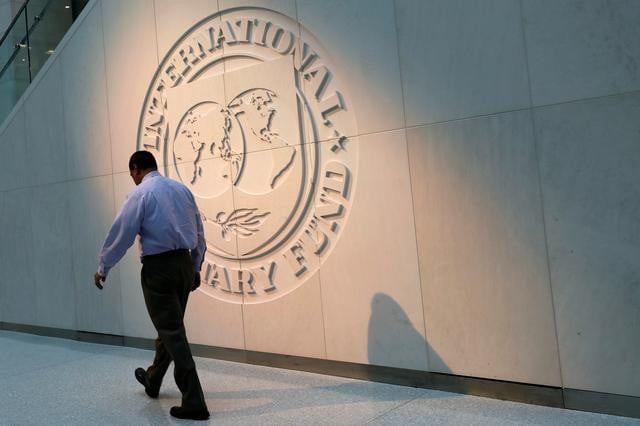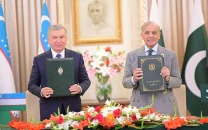IMF toughens stance on loan tranche release
Lender links $1.2b approval with bridging yawning financing gap

The International Monetary Fund (IMF) on Tuesday conditioned the approval of the $1.2 billion loan tranche in late August with Pakistan’s ability to timely secure ‘adequate assurances’ from friendly countries for more loans to bridge financing gap, exposing Islamabad to demands by its bilateral creditors.
In a terse statement, Resident Representative of the IMF, Esther Perez, said that “with the increase in PDL (Petroleum Development Levy) on July 31, the last prior action for the combined 7th and 8th review has been met”.
The merger will pave the way for the release of nearly $1.2 billion tranche, as against the original schedule of the $2 billion.
But Esther remained short of giving a confirmed board meeting date due to what the IMF sees a gap against Pakistan’s gross external financing requirements.
“The board meeting is tentatively planned for late August once adequate financing assurances are confirmed,” Esther Perez said.
The IMF gave the unexpected statement two days after the Ministry of Finance and the State Bank of Pakistan had claimed that they had met the financing requirements for the current fiscal year.
Chief of the Army Staff General Qamar Javed Bajwa had also appealed to the US to help Islamabad secure an early dispersal of $1.2 billion. The Foreign Office on Friday confirmed that there have been contacts between General Qamar Javed Bajwa and US Deputy Secretary of State Wendy Sherman.
It seems that the contacts have also not helped Pakistan to secure an early confirmed board meeting date. Islamabad will have to convince the three main bilateral creditors to directly assure the IMF that they are willing to chip in $4 billion financing.
Although the IMF did not publicly disclose the quantum of the financing gap, Finance Minister Miftah Ismail had said last month that the gap was $4 billion against the estimated financing requirements of over $35 billion.
However, Miftah Ismail said on Tuesday that “there is no financing gap and the $4 billion will actually end up in increasing the foreign exchange reserves by over $6 billion in this fiscal year”.
The minister had also given a plan for arranging these funds from Saudi Arabia, the United Arab Emirates and Qatar in shape of oil and gas on deferred payments, selling state assets and shares of the listed companies and borrowing against the quota of Saudi Arabia.
So far no meaningful progress has been made, which has held back the IMF from officially announcing the August 24th board meeting date.
Hamad Obaid Ibrahim Salim Al-Zaabi, Ambassador of the UAE, called on Miftah Ismail on Tuesday.
“The finance minister apprised the UAE’s ambassador about the potential investment areas where the UAE can invest and also assured the ambassador of UAE of greater facilitation and support,” according to a statement released by the Ministry of Finance.
The ambassador of UAE also showed keen interest in enhancing and strengthening the bilateral relation between both countries especially on economic fronts, it added.
Pakistan is trying to arrange $2 billion to $2.5 billion from the UAE through emergency sale of two LNG-fired power plants and offloading stakes in its blue-chip companies.
On Sunday, the Ministry of Finance and the SBP in a joint statement said that this fiscal year’s financing needs stem from a current account deficit of around $10 billion and principal repayments on external debt of around $24 billion. In order to bolster Pakistan’s foreign exchange reserves position, it is important for Pakistan to be slightly overfinanced relative to these needs, it added.
“As a result, an extra cushion of $4 billion is planned over the next 12 months. This funding commitment is being arranged through a number of different channels, including from friendly countries that helped Pakistan in a similar way at the beginning of the IMF program in June 2019” , according to the joint statement.
The dwindling economy has caused the rupee to shed its value by 30% or Rs54 per dollar since Shehbaz Sharif came in power in April, also exposing the inexperience of the Sharif administration.
Last week, the Finance Minister said that the IMF had set the prior conditions of approval of the new budget, a memorandum of understanding with the provinces to create cash surpluses, raising petroleum levy rates, increasing electricity prices in July, August and October and increasing interest rates. He said that these conditions have been met.
Both the Ministry of Finance and the SBP had hoped that since all prior actions for completing the review have been met and “the formal Board meeting to disburse the next tranche of $1.2 billion is expected in a couple of weeks”.
The IMF statement denies this impression of securing the board meeting in two weeks.
Despite a delay in revival of the programme, the federal government now hopes that the pressure on the rupee value has been eased after nearly 38% reduction in the import bill in July over the preceding month. It added the foreign exchange payments in July were significantly lower than in June. The payments were a sustainable $6.1 billion in July compared to $7.9 billion in June, it added.



















COMMENTS
Comments are moderated and generally will be posted if they are on-topic and not abusive.
For more information, please see our Comments FAQ